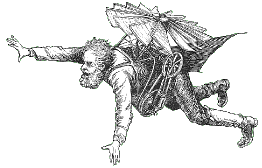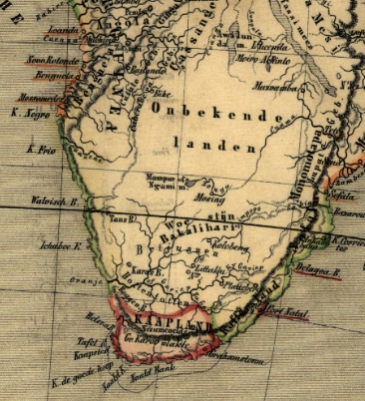| Gothic Steam Phantastic > Information > Lonely planet |
 Lonely planet |
 |
| -*- Home -*- Daleth-*- I&I RPG -*- Information -*- Forum -*- Credits -*- Links -*- |
Exploring the lonely planetIn Victorian times, the last undiscovered places of Planet Earth were explored, or attempted to be explored. Next stop, space.First of all, upon discovering strange lands with strange people and unknown civilisations, these strange lands had been discovered by these strange people of course. But from a colonial point of view, this doesn't count. Only when white men discovered new lands and put it on a map, it truly was new land, regardless of what lived there before the white men came. This goes also for science fiction: you can discover new planets with new aliens, and sometimes the aliens discover earth, but in fact, it stays the same. The Aboriginals have no right to discover Australia, so to say, because they already lived there as the white men came. But that is not what this column is about. It's about 19th century explorers, the Livingstones and Quartermains, who go boldly forward where no (white) man has gone before. They poke into undiscovered parts of earth, peek into the jungle, cross the deserts, look around under the ocean, travel to the Middle of the Earth. They meet new, ancient civilisations, and will do research in order to find the roots of these lands with sciences like archeology and anthropology. They want to get to know the world they are living on. A great theme for Victorian adventures. Nowadays, there hardly is a place on earth that has not been described in a volume of The Lonely Planet. Each place has been discovered, seen, travelled, photographed; has its own Hard Rock Cafe and its local MacDonald's. Maybe not all places, but what remains is too small to appear as white on any map. To make a believable Victorian setting, it must be important to leave some white spots to discover. The world is not known yet in these age, and adventurers set sail to the unknown parts; something that was not possible or necessary before apparently. That's what it makes exciting, not knowing what is around the next corner, and you can grab the opportunity to wipe out some white with both hands.
The UnknownPartly, these (formally) white regions on the maps have been replaced by other white places. Freud explored at the end of the 19th century the then unknown realms of the human psyche and dreams, staying closer to his home in Vienna, but yet an adventure on its own.Many people, including scientists, tried to discover the world of the ghosts. Where nothing was revived (Atlantis), it was invented (Mu). Theosophical, mystic and esoteric ideas have there roots planted firm in the 19th century (although they claim to go much further back than that). Gothic horror and the science of parapsychology are based on the same ideas of discovering the unknown. Next to the psyche, dreams and ghosts, the world of Steampunk comes with another possibility: space flight. When the world is discovered, fully explored and leaves no mysteries, space is the final frontier, as they say in Star Trek. Be it steam powered or aether driven flight, steampunk gives the opportunity to let the Livingstones and Quartermains explore the white (black?) parts of space and discover such unknown civilisations as the Martians, along with other aliens. In many ways, science fiction aliens, especially those of the pulp area, and the "lost civilisations" of the white regions act the same, are the same. They are like the Wild Men of the jungle, probably "Noble Wilds", in some cases they still have the advanced civilisation (Maya, Egyptian, Atlantis) that has faded into the past on earth. Large animals of unknown origin lurk in the alien jungles of far away planets, or these planets are as uninhabitable as the Polar Regions. But basically, the theme and the scheme are the same. Race for spaceNow the question that remains is, why would a civilisation take off to discover space, if it does not know it's home planet yet? A question not really answered in many books. Was it the Martians that made first contact and gave Earth the idea and tools to "discover" space flight? Was it a crazy idea by a mad scientist that first gave access to space?A lot of advantages in space flight have been achieved because of the cold war, always keen to beat the other party at "first man in space", "first man on the moon" and such, the Cold War has accelerated the developments. Do you need such competence when the race for space starts in your steampunk setting? Who pays for a risky endeavour like building space ships anyway? Is there anyone who can afford this, including one of the nations? What made them rich? And what profit do they think they can make with it? Some questions that might enrich the common pulp of steam space... © Yaghish 2003 |
| -*-© Steammasters 2003-*- |
| ^ Up |
 Map of the southern part of Afrika
Map of the southern part of Afrika